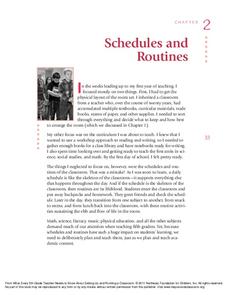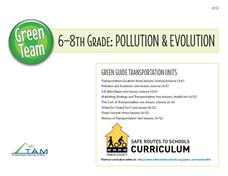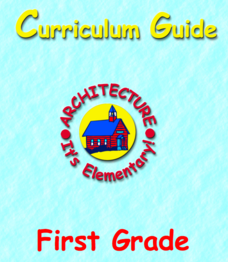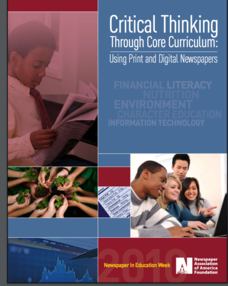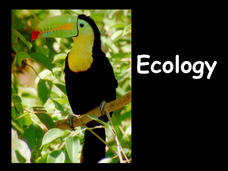Northeast Foundation for Children, Inc.
Schedules and Routines: Grade 5
Before diving head first into the year's curriculum, take time to establish clear routines and procedures for your classroom. Starting with how to set up a class schedule that meets the needs of fifth grade learners, this sample chapter...
Science 4 Inquiry
Deforestation
Young scientists observe deforestation from satellite photos and discuss the importance of forests to the global environment. They then simulate a plot of forest when farmers move into the area over the course of seven years. Finally,...
Chicago Botanic Garden
Migration, Adaptation, and Changing Climates
It is easy for humans to adapt to changing environments, but how do animals and plants do it? Classes discuss how plants and animals deal with environmental changes in the second of seven lessons. Through questions and discussions,...
Science Matters
Basic Needs
Scholars take part in a grand conversation about the basic needs of living things. Working collaboratively, pupils brainstorm and identify similarities to come to the conclusion that the environment meets the needs of all living things.
Safe Routes to School
Pollution & Evolution
Bring together a study of two major scientific topics with a lesson on the relationship between pollution and evolution. With the help of a PowerPoint presentation, hands-on activity. and class demonstration young scientists learn how...
EngageNY
Speaking and Listening Skills: Practice
After reviewing their resources from the unit, scholars participate in multiple group discussions with a World Café activity. During the discussions, they share ideas about their focus questions pertaining to Canada's natural resources...
Maryland Department of Education
The Concept of Identity Lesson 2: The Historical/Biographical Approach
"How does our environment shape our identity?" After researching biographical information about John Knowles and considering how these experiences are reflected in A Separate Peace, class members consider the strengths and weaknesses of...
Columbus City Schools
The Mystery of Earth’s History
Every living creature can leave a fossil record, yet most fossils belong to extinct organisms rather than ones currently living. Scholars learn about dating rock layers, fossils, and the environment of the past. Pupils understand that...
Channel Islands Film
Island Cattle Ranching
Is cattle ranching on Santa Rosa island viable or non-viable? Rather than focusing on the issues of the transition of Santa Rosa island from a privately owned island cattle ranch to a national park, class members are asked to consider if...
Science Matters
Lotusland
It's time for a field trip! Scholars take their new-found knowledge of adaptations and seed dispersal on a field trip to a local botanical garden. They gain an up-close look at how ecological interdependence works in a distinct...
Serendip
Changing Biological Communities – Disturbance and Succession
After cutting down a forest to make a farm, how long would it take the environment to turn an abandoned farm back into a forest? Scholars study this exact scenario while they interpret many charts and graphs of the changing ecosystems as...
American Institute of Architects
Architecture: It's Elementary!—First Grade
Build an interest and appreciation for architecture in your young learners with this fun 10-lesson art unit. Engaging children in using their five senses, the class first observes the environment around them, paying special attention to...
UAF Geophysical Institute
Carbon Footprint
Your young environmentalists can calculate their carbon footprint and discuss ways to reduce it with a worksheet about climate change. After reading a handout about what impact one's carbon footprint can have on the environment, kids...
Owl Teacher
Introduction to World Geography
Give your learners a thorough overview of what they will learn when studying geography, from the five themes of geography (location, place, environment, movement, and regions) to the tools of a geographer and parts of a map.
Dick Blick Art Materials
Very, Very Simple Decorative Papers
Combine art and science with an activity that has kids gathering items from their environment to include in the decorative paper they create.
New South Wales of Education and Communities
Setting the Scene
How to establish a safe classroom environment for discussion is the focus of this introduction to a series of six resources devoted to personal safety.
Curated OER
Committing to Respect: Lessons for Students to Address Bias
Here's a guide designed to build safe, respectful learning environments, and to build understanding of the value of diversity through lessons packed with activities for specific grade levels.
Newspaper Association of America
Critical Thinking through Core Curriculum: Using Print and Digital Newspapers
What is and what will be the role of newspapers in the future? Keeping this essential question in mind, class members use print, electronic, and/or web editions of newspapers, to investigate topics that include financial literary,...
Columbus City Schools
Sedimentary Rocks
Turn your class discussion of rock formation from ho-hum to holy hornfels! Junior geologists gain experience in identifying rock types and rock origins, with an emphasis in hypothesizing the environment needed to form certain rocks. The...
Channel Islands Film
Dark Water: Lesson Plan 2 - Grade 3
A discussion of bioluminescence launches an investigation of animal adaptations. After re-watching the opening minutes of Dark Water, class members listen to a reading of What Do You Do with a Tail Like This, and then create a new animal...
American Psychological Association
Do Cookies/Donuts Improve Memory? Errors in Methodology
If the methodology is skewed, the results will be skewed. That's the takeaway from an exercise designed to get class members thinking about research methods and statistics gathering. Instructors manipulate the testing environment to...
Biology Junction
Ecology
Psychologists study human relationships while ecologist study relationships between organisms in the environment. An introduction to ecology and the related vocabulary benefits scholars as they progress through the presentation and...
American Museum of Natural History
What is Marine Biology?
A marine environment covers the majority of the earth but is arguably the least understood. Teach young scientists about the characteristics of oceans and ocean species using an interactive online lesson. The in-person or remote learning...
National Science Teachers Association
Safety in the Science Classroom, Laboratory, and Field Sites
The best learning environment is a safe learning environment. Remind young scientists about safety rules and regulations in the science lab, the classroom, and the field.
Other popular searches
- Environment Science
- Environmental Science
- Environmental Resources
- Environmental
- Environmental Health
- Human Impact on Environment
- Environmental History
- Our Environment
- Human Environment
- Environment Volunteering
- Environmentalism
- Environment Research Projects


